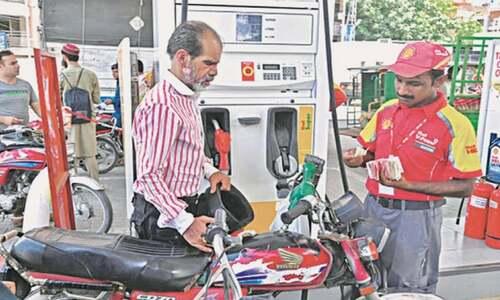REVENUE collection in Khyber Pakhtunkhwa has not gone much beyond Rs20bn, mainly because of the provincial government’s weak fiscal governance, with the maximum contribution coming from the general sales tax on services.
The province does not have any effective programme to maximise revenue generation. As a result, the share of provincial tax revenue is stuck at a dismal low of 0.47pc of GDP.
A revenue collection target of Rs22.594bn has been set for 2015-16, against Rs19.831bn collected over last year.
KP hopes to raise Rs3.801bn in direct taxes in FY16 (including around Rs1.8bn from land revenue), which will constitute 16pc of its overall tax revenues for the year
Officials in the provincial finance ministry estimate an over Rs4bn shortfall in the target for the outgoing fiscal year.
Therefore, the target for the current fiscal year seems over-ambitious.
Over 83pc of the provincial tax revenue is contributed by indirect taxes. The rich landed gentry is taxed lightly. The tax collection on farm incomes is meagre when compared to its revenue potential.
The last NFC Award had stipulated that the provinces would increase their share in tax revenue, but this has not happened.
Tax experts attribute the poor tax collection to weak administration, low taxable capacity, huge informal sector, limited revenue base and political unwillingness to exploit the potential because of pressures by interest groups.
The province hopes to raise Rs3.801bn in direct taxes in FY16 (including around Rs1.8bn from land revenue), which will constitute 16pc of its overall tax revenues for the year. KP had collected an estimated Rs2.682bn in direct taxes in FY15.
This included taxes on agriculture, property, land revenue, trade and professionals etc.
The surcharge on land revenue is in fact not a tax but the rent payable to the state, and includes irrigation water charges (abiana).
Tax revenues from agriculture, real estate and other under-taxed sectors are low because of strong resistance from the province’s ruling elite. The government has projected an amount of Rs1bn to be collected from farm incomes in the year 2015-16, against Rs79m in 2014-15. This appears to be another over-ambitious target, unless the tax administration is improved.
The province is also facing challenges in widening the agricultural income tax (AIT) base, apart from the ambiguity in the application of the law for assessing and collecting AIT.
The revenue staff collects the AIT on the basis of the flat rate of the land tax, instead of assessing annual incomes derived from landholdings in a year as prescribed under the AIT Ordinance 2000. The land revenue option given to the farmers must end.
Meanwhile, revenue from the urban immovable property tax (with a narrow base) has stagnated at around Rs300m despite the increase in the rental value of buildings and lands. This calls for the revaluation of property values for tax assessment, while the property tax net must also be expanded. The collection from the levy has been projected at Rs385m in the 2015-16 budget, against Rs350m in 2014-15.
Indirect taxes comprise the provincial excise duty, motor vehicle tax, stamp duties, entertainment tax and electricity duty etc. These yielded Rs18.793bn in FY15, 75pc of which came from GST on services, followed by 8.7pc from the motor vehicle tax.
In July 2013, the Khyber Pakhtunkhwa Revenue Authority (KPRA) was created to collect the sales tax on services, but its affairs are being run on ad-hoc basis so far. As a result, the KPRA has failed to develop its own sales tax rules despite a lapse of two years, and it is still following the Federal Board of Revenue’s rules. The draft KP Sales Tax on Services Rules 2015 is posted on the authority’s website, with no deadline for its finalisation.
The provincial government also intends to collect Rs1bn from the infrastructure development cess (IDC). The collection of IDC, entrusted to the KPRA, is being held up as it requires resolution at the federal level. The IDC was introduced in the provincial budget for the fiscal year 2014-15, with a collection target of Rs2bn.
More than 120 items are subject to varying stamp duty rates, but the bulk of the revenue is collected from stamps on property transfers. The stamp duty includes virtually all kinds of transfers and legal documents. The revenue collection from this head is projected at Rs814m for 2015-16 against Rs740m in 2014-15.
The entertainment tax has shown a negative growth, while there are still some big cinemas owned by the elite. They contribute almost nothing to the provincial revenue.
And the government hopes to collect Rs688m through hotels, real estate dealers, motor dealers and tobacco development cess etc in this fiscal, only nominally above Rs598m in 2014-15.
The growth rate in overall provincial tax receipts has showed a slight upward trend.
But the finance ministry’s white paper 2015 says economic development in the province has remained under the shadow of the poor law and order situation, which has adversely affected revenue growth.
Published in Dawn, Economic & Business, August 17th, 2015
On a mobile phone? Get the Dawn Mobile App: Apple Store | Google Play














































